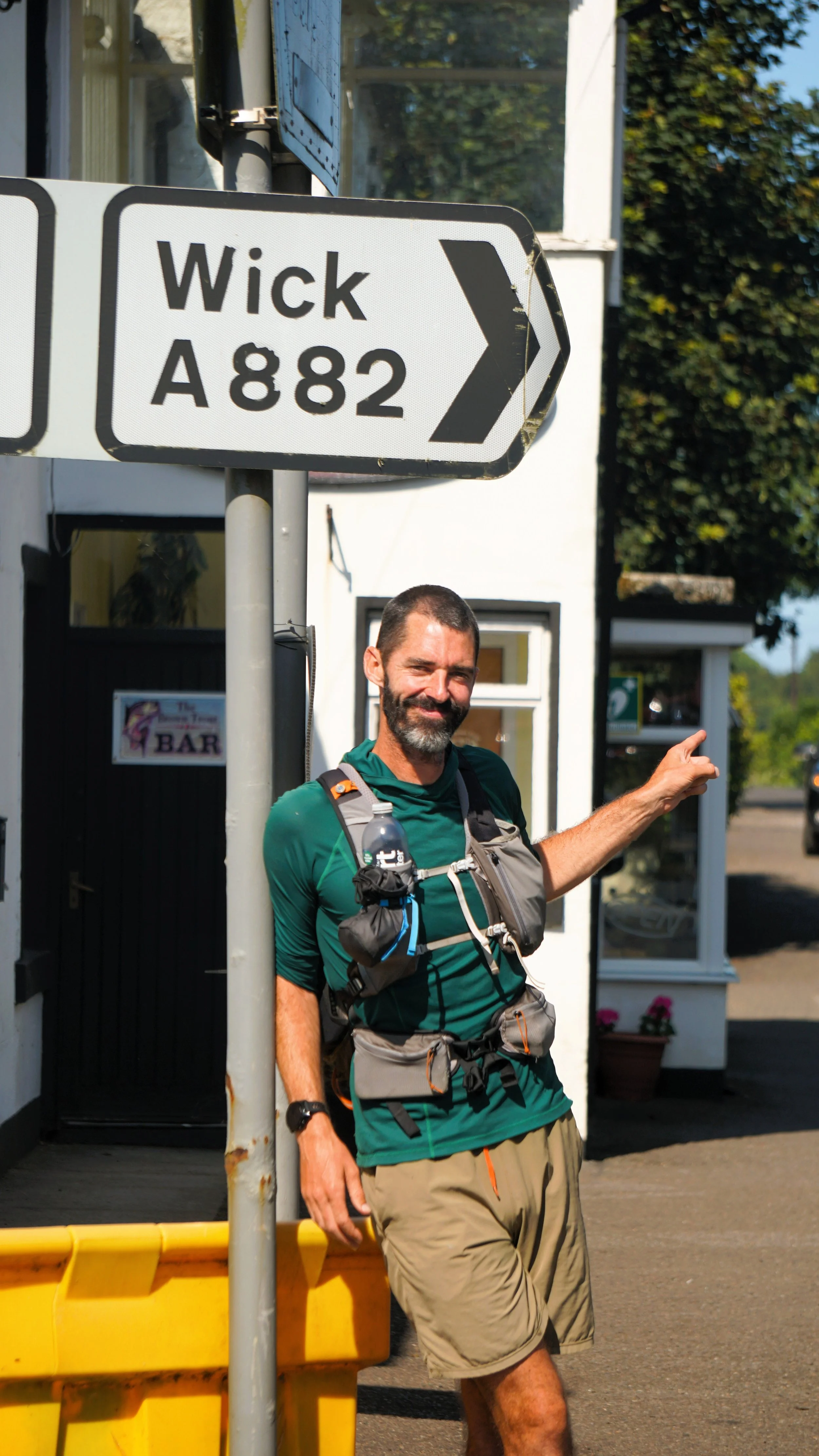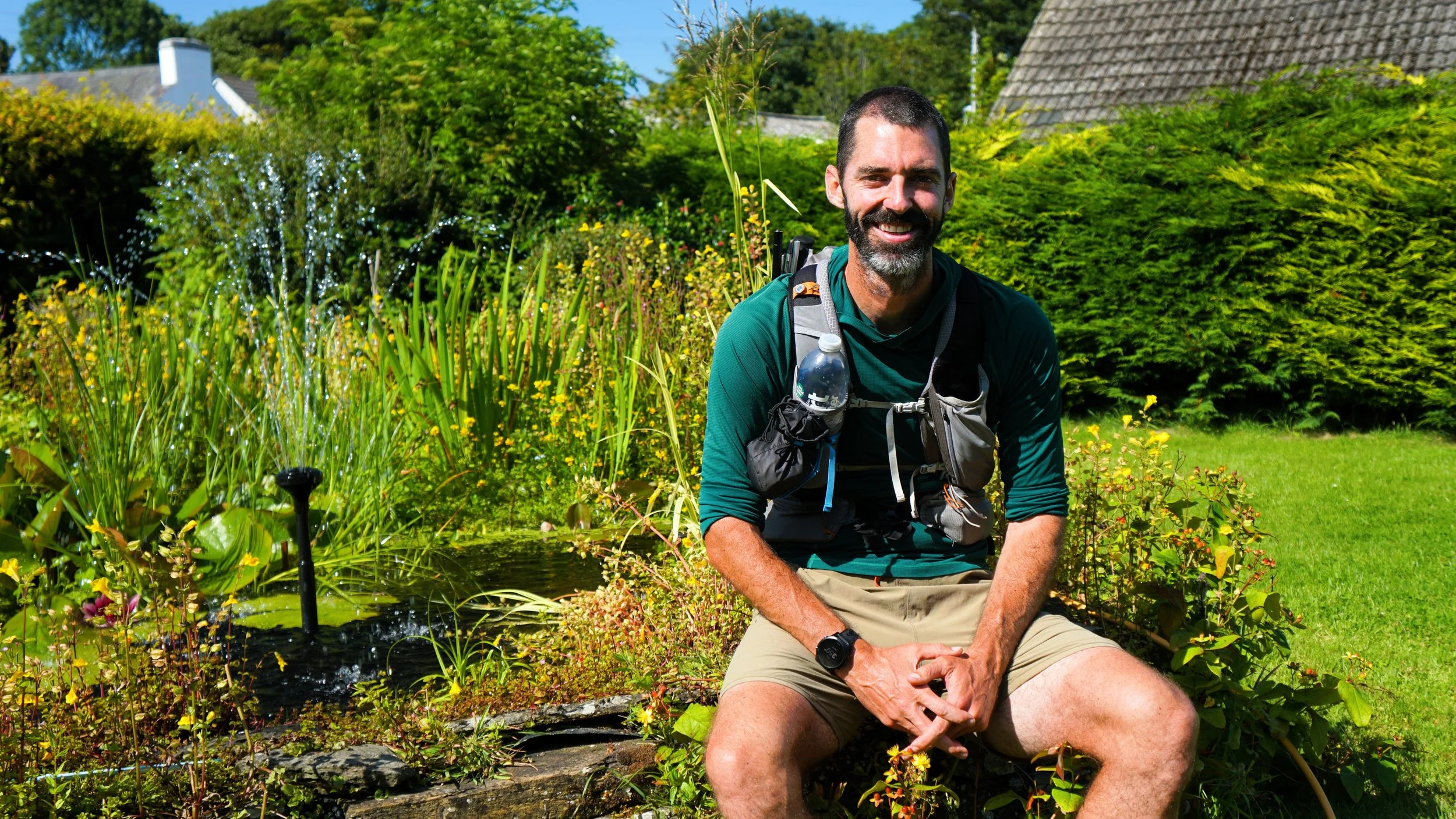“Just a fairly normal guy who wanted to do a big thing.”
Without doubt the Homeless World Cup is emotive, compelling and brings out the best in everyone touched by its power to change lives.
That’s recently been witnessed in the superhuman challenge taken on by one Andy Suiter, to raise funds and awareness for the Foundation.
From his hometown of Walnut Creek, California to John O’Groats, Caithness is 5,230 miles, as the crow flies. Consider the 1200 miles of terrain between that Scottish destination and Land’s End, Cornwall, however, and you’ve got some idea of the ‘extra mile’ Andy went in that challenge.
Self supported, carrying what he needed to camp out - with occasional stops for hot meals and a bed where required - Andy ran an ultramarathon of 30 to 40 miles a day for 35 days, from Land’s End to John O’Groats, raising funds along the way…and his motivation bore similarities to many participants at the Homeless World Cup, as we caught up with him in Edinburgh the day after completing his run.
“I’m easily inspired,” he says. “I follow enough people who do big things like this to get it in my mind that I really would love to do something long distance, explore a new place and, where the Homeless World Cup Foundation really fitted in, was when I met James [McMeekin, Homeless World Cup Chief Operating Officer] and Monica [Ibarra, Homeless World Cup Administrator and Volunteer Coordinator] and heard about what they were doing, I really connected with that at a deep level.
“I played professional baseball until I was 25 [Andy signed with the LA Dodgers in 2009] and it was a huge part of my identity, so when I was released at 25 it was a really difficult time for me, for a number of years.
“I was fortunate to have a family and close friends to rally around me at a time when it could have very well been a different story.
“So when I think about the Homeless World Cup and the tournament, it’s creating an opportunity for people to be able to rise up, to have the opportunity to get back on their feet, to feel inspired to find that confidence and belief in themselves. We need the support of other people around us and that’s what I had but a lot of people aren’t that lucky.”
A huge part of regaining his confidence was getting into running and Andy saw the positive impact that had on his mental health. Starting with marathon running he progressed to endurance events including Iron Man then ultra marathons.
“For this challenge, I started with a hundred-mile race last summer,” he explains, “as a test run to see how my body would hold up. Then in the six month run-up to this, I put in as many hours as I could on my feet, so many weekends would be five or six hours on a Saturday then four or five on a Sunday.
“Even with all that training, however, you can’t prepare for something like this. Your body’s going to go into shock that first week, no matter what!”
Mental prep for the run was equally key as Andy says, “My meditation practice was vital. I spent a week in the mountains in Colorado where you’re sitting in long periods of meditation, diving into the practice of acceptance of all thoughts because much of the time your thoughts can start to become negative, or the physical discomfort in your hips and knees overshadows everything.
“Just noticing that and coming back to the present, being able to let that go, was huge for this challenge. Being able to say okay I’ve got this knee pain, I’m tired, not feeling it today and letting that all go.
Donate to andy’s fundraising campaign here
“The other thing was really reminding myself why I was doing it - that’s the biggest thing to get yourself through. If you don’t know why you’re running for 35 days straight or unable to connect with that mission in your mind, it would be really easy to give up. I was able to draw on many ‘whys’ and that meant it was going to take a lot for me not to pull this whole thing off!”
Having done plenty research which highlighted the first seven to ten days were crucial and brutal, coming to a point where, “Everything in my body just wanted to shut this thing down,” assured him that mindset was normal. The turning point for Andy, however, came when he actually took a day off running!
“It was really important to have this self compassion and accept that a day off is okay,” he underlines. “Athletes can be pretty intense with themselves and set these incredibly high standards - I’m not a professional runner, I’m just a fairly normal guy who wanted to do a big thing - but you still create these enormous numbers in mind in terms of mileage.
“When I took a day off, it was really important to see this thing as an adventure, a journey, not as a competition - I wasn’t going out there to set any sort of record - and my body needed it. That was day 18 and, after that, I was really able to start enjoying the effort without any real pains or injuries holding me back whereas during the first seventeen days I felt I was right on the edge of something keeping me from being able to pull it off.”
His route between mainland Britain’s most southerly and northerly points had also involved much research. Many apps outlined the straightest, quickest route but Andy wanted to follow as many historical trails as he could, so found an app (Komoot) which allowed him to create a path avoiding as much tarmac as possible and that provided his geographical high.
“In Scotland there’s a point where you start to spot the Munros, that serious Highland Scotland that I’ve fallen in love with, it’s just totally majestic,” he enthuses. “Then also right back to day one, Cornwall blew me away - the ocean, the rugged path running along it was stunning.”
But more than the scenery, it was the people that really made his journey special. “Everyone was so supportive,” he says. “For example, on my last day, I decided to make a big push of over 50 miles, but the night before I’d walked into a Spar convenience store and was chatting with the woman at the cash register and she was like, ‘You’re doing what?! You’re running on the road to get to John O’Groats?’
“She asked if I had a hi-vis vest and I said no. So she found out where I was staying and had her husband drop off his hi-vis vest so I had something to protect me. I put it on the next morning and it was really helpful because there were times when it was slight visibility, low cloud and rainfall and it made me feel extra secure.
“That was just one of many instances where I’d have a brief conversation with someone and they’d be more than willing to help out - like giving me a banana because they were out on a casual cycle and said they didn’t need it. It was amazing how much the simplicity of kindness and a little warmth would pick me up when I needed it most.
“People were just excited for me and encouraging me - most people who donated were those I met on the trail. I’d have a brief chat with them then, the next day, I’d see they had pledged money, sending encouraging words and a donation. So that felt really special.”
The kindness of strangers was to the fore right to the end, too, as he relates, “There’s this cool signpost pointing south, telling you the mileage to Land’s End, so the finish line was touching this post. It was such a beautiful day, 8pm, stunning lighting and there were still people around who I asked to take photos.
“The thing I loved most is when my taxi driver pulled up - I unfortunately missed the last bus to Wick, so I had to get a taxi there - he knew what I’d just done so he said ‘Take all the time you need, you deserve that beer!’”
As a result of his challenge Andy’s next venture, however, will be less physical and more cerebral. “I’m going into the sports psychology/mental health space,” he explains. “There was a moment in this adventure where I met this young man - out at these waterfalls along the Pennine Way - and we got into conversation.
“He opened up and said he was going through some serious depression. I had gone through that myself for a number of years after finishing baseball. It was a really powerful interaction and he ended up saying that meeting me and having this conversation was really important, and the best day he’d had in months. He’d had the courage to drive out to this waterfall, jump in, swim with other people around then sit down and have lunch with me.
“Coming out of that really made me want to dive deeper into mental health, being able to share the experience I had but being able to talk about how to get out of that. There was a point where I could never have imagined doing something like this, having strong friendships, feeling a level of confidence to pull something off like this, and I find that so sad that people get to this place in life where they lack all of that self belief.
“I would love to be able to share my story and speak to as many people as possible going through that because there is a light at the end of the tunnel - sometimes it’s just very hard to see.”



